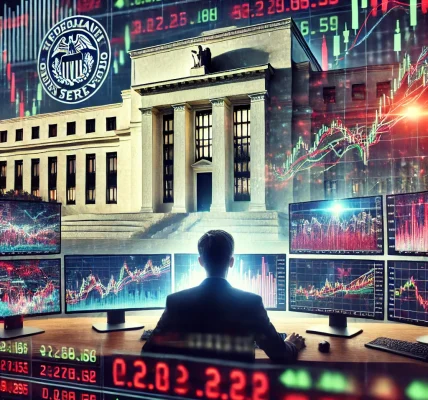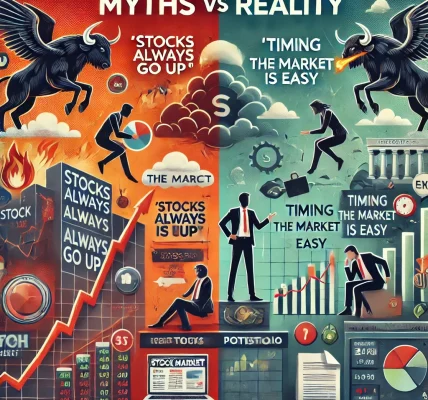Introduction
The stock market is highly sensitive to global events, and 2025 is proving to be no exception. From geopolitical conflicts to economic policy shifts and technological advancements, various factors are influencing investor sentiment and stock market trends. Understanding these forces can help investors make informed decisions and adapt to the ever-changing financial landscape.
In this blog, we will explore the key global events affecting the stock market in 2025, analyze their impact on different sectors, and provide insights for investors looking to navigate this complex environment.
1. Geopolitical Tensions and Their Market Impact
Ongoing Trade Wars and Tariffs
- In 2025, major economies like the U.S., China, and the European Union continue to engage in trade disputes, affecting international supply chains.
- Increased tariffs have led to higher production costs, impacting companies reliant on global manufacturing.
- Sectors affected: Technology, Consumer Goods, and Industrial Manufacturing.
Regional Conflicts and Their Influence
- Military conflicts and political instability in key regions have caused fluctuations in global commodity prices.
- Investors seek safe-haven assets like gold and government bonds during times of uncertainty.
- Sectors affected: Energy, Defense, and Precious Metals.
2. Economic Policies and Central Bank Decisions
Interest Rate Adjustments
- The U.S. Federal Reserve, European Central Bank (ECB), and Bank of Japan have adjusted interest rates in response to inflationary pressures.
- Higher interest rates generally lead to lower stock valuations, affecting high-growth sectors such as technology.
- Sectors affected: Banking (positive impact due to higher lending rates) and Technology (negative impact due to higher borrowing costs).
Inflation and Currency Fluctuations
- Many economies are battling inflation due to supply chain disruptions and increased energy prices.
- Currency devaluations in emerging markets have led to capital outflows, impacting multinational corporations with international exposure.
- Sectors affected: Retail (consumer spending decline), Imports & Exports, and Forex Trading.
3. Technological Disruptions and Stock Market Shifts
Rise of Artificial Intelligence (AI)
- AI continues to revolutionize industries, boosting productivity and efficiency.
- Companies investing in AI-driven automation and data analytics have seen stock prices surge.
- Sectors affected: Technology, Healthcare (AI-driven diagnostics), and Financial Services (algorithmic trading).
Cryptocurrency Regulations and Adoption
- Governments worldwide are implementing new regulations for cryptocurrencies, impacting investor sentiment.
- Institutional adoption of blockchain technology is gaining momentum, benefiting stocks related to fintech and decentralized finance (DeFi).
- Sectors affected: Cryptocurrency & Blockchain, Financial Services, and Cybersecurity.
4. Environmental and Climate-Related Events
Green Energy Policies and ESG Investments
- Governments are introducing stricter carbon emission regulations, forcing companies to transition towards sustainable energy.
- Investors are favoring Environmental, Social, and Governance (ESG) stocks, shifting capital towards renewable energy firms.
- Sectors affected: Renewable Energy, Electric Vehicles (EV), and Sustainable Infrastructure.
Natural Disasters and Their Economic Consequences
- Hurricanes, wildfires, and floods are causing disruptions in supply chains and affecting agricultural production.
- Insurance companies are seeing increased payouts, impacting their stock prices.
- Sectors affected: Agriculture, Insurance, and Construction.
5. The Changing Landscape of Global Trade and Supply Chains
The Rise of Regionalization
- Companies are reshoring production or shifting to alternative suppliers to reduce reliance on unstable regions.
- Investments in automation and AI-driven logistics are streamlining supply chain management.
- Sectors affected: Manufacturing, Logistics, and Robotics.
Shortages and Their Impact on Consumer Goods
- Semiconductor shortages continue to affect industries like automobiles and electronics.
- Rising raw material costs have led to inflation in consumer goods, impacting purchasing power.
- Sectors affected: Automotive, Electronics, and Consumer Goods.
6. Key Takeaways for Investors
- Diversification is Crucial: Global events can cause unexpected volatility; spreading investments across industries and geographies can mitigate risks.
- Monitor Central Bank Policies: Interest rate changes significantly impact stock valuations and borrowing costs.
- Stay Updated on Trade Policies: Tariffs and supply chain disruptions can affect corporate profitability.
- Invest in Long-Term Trends: AI, renewable energy, and ESG investing are shaping future markets.
- Consider Safe-Haven Assets: During uncertainty, assets like gold, government bonds, and defensive stocks can provide stability.
Conclusion
The stock market in 2025 is being shaped by a mix of geopolitical, economic, technological, and environmental factors. Understanding these trends can help investors make better-informed decisions and adapt to market changes effectively. While short-term volatility is inevitable, focusing on long-term opportunities and diversifying investments can lead to sustainable growth.




